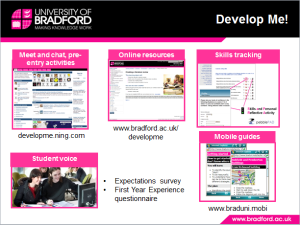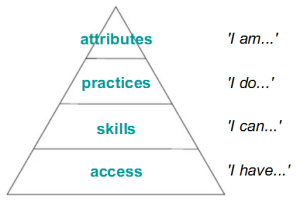One of the links in the OcTEL orientation resources takes you to this publication. As it is a whole book don’t even think about pressing ‘print’! Transforming Higher Education Through Technology Enhanced Learning Publication Date: 23-12-2009 Available at http://www.heacademy.ac.uk/resources/detail/learningandtech/transforming_he_through_technology_enhanced_learning
It is in 3 sections – the first two of which I have skipped over in order to get to the ‘how’ of the matter.
Section 1: National policy
Section 2: Institutional approaches
Section 3: Technology and pedagogy – tools facilitating transformation
Today’s reading is Sharpe, R. Chapter 13 – The impact of learner experience research on transforming institutional practices
The following is not a review of the book – I have been prompted to put some thoughts together after reading it.
First stop a sign-up to ELESIG http://elesig.ning.com – projects working in learner experience research. First impression: looks really interesting and manageable. But back to the book chapter:
Case Study 1 Currant p184 on DevelopMe!
Develop Me! is a social network space for the University of Bradford. The site is open to anyone involved in the University of Bradford.
From the PowerPoint above you can see includes the social space via ning, online resources, online self-assessment tool which I find interesting. So it seems to be a ‘one-stop shop’ – pre-entry, orientation, online resources, skills tracking…I guess students probably then migrate to Facebook once they feel more established but I thought it appeared to have lots of benefits. Obviously very helpful for pre-entry students, pre-Christmas wobbles etc. I am struggling to find much commentary on whether this is the case but it appeals to me.
For me this also links to the acquisition of tacit knowledge / transitions which are discussed in Wenger’s CoP. It is this awkward fumbling forward due to a lack of knowledge on ‘how things are done around here’ that make us uncertain even though we are capable. So I think anything that helps with this has to be a good thing. It has one very interesting additional part which is discussed further in the book and this is the ‘student voice’ part which is helping to shape changes at the Uni.
Case Study 2 Benfield & Francis p185
I extracted this from the case study p186 because it articulates so well what we would like to see at the end of our efforts:
In the digital age, along with proficiently handling information, Oxford Brookes graduates should be adept at managing human interactions and knowledge building using digital tools. Specifically, they should be:
- self-regulating citizens in a globally connected society;
- able to handle multiple, diverse information sources and media;
- proficiently mediating their interactions with social and professional groups using an ever changing and expanding range of technologies; and
- able confidently to use digital technologies to reflect on, record and manage their lifelong learning.
This struck a chord with me because I attended a JISC event where the Beetham and Sharpe model below was used in a workshop. If we can articulate the practices that we hope to see as a result then it is easier to find a route to it, also that this can be aspirational and lifts us beyond ‘skills lists’ onto practices and then attributes/ identity.
Full detail Beetham, H. and Sharpe, R. (2011) Literacies development framework, JISC, [online] Available at: <http://jiscdesignstudio.pbworks.com/w/file/40474958/Literacies%20development%20framework.doc>
Wenger (1998: 215) describes how learning informs identity,
‘Because learning transforms who we are and what we can do, it is an experience of identity. It is not just an accumulation of skills and information, but a process of becoming – to become a certain person or, conversely to avoid becoming a certain person [...] We accumulate skills and information in the service of an identity.’
Therefore more reading and thinking about COP and identity…

